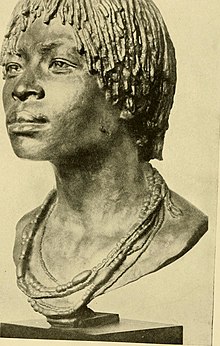Kongo (plemię)
Kongo lub Bakongo, Wakongo, Sundi – lud afrykański z grupy Bantu, zamieszkujący ziemie wzdłuż dolnego biegu rzeki Kongo oraz nadmorskie prowincje Angoli, Demokratycznej Republiki Konga, Konga, Gabonu; około 8 milionów (lata 90. XX wieku); wierzenia tradycyjne (kult przodków, kult boga-stwórcy Nzambi Mpungu) i o charakterze synkretycznym (kimbangizm i inne); w XIV–XVIII w. zorganizowani w ramach Królestwa Konga; główne zajęcia: uprawa zbóż, myślistwo, w niektórych rejonach hodowla; dawne i bogate tradycje rzemiosła (głównie tkactwo, plecionkarstwo, garncarstwo); rozwinięta sztuka (nagrobne rzeźby kamienne, fetysze itp.); struktura rodowa oparta na poligynicznej (poligynia) rodzinie matrylinearnej (matrylinearność).
Zobacz też
Media użyte na tej stronie
Autor: Internet Archive Book Images, Licencja: No restrictions
Identifier: voicefromcongoco00ward (find matches)
Title: A voice from the Congo : comprising stories, anecdotes, and descriptive notes
Year: 1910 (1910s)
Authors: Ward, Herbert, 1863-1919
Subjects: Ward, Herbert, 1863-1919 Africa, Central -- Description and travel Africa, Central -- Social life and customs
Publisher: New York : Charles Scribner's Sons
Contributing Library: University of Connecticut Libraries
Digitizing Sponsor: University of Connecticut Libraries
View Book Page: Book Viewer
About This Book: Catalog Entry
View All Images: All Images From Book
Click here to view book online to see this illustration in context in a browseable online version of this book.
Text Appearing Before Image:
hundreds of naked feet shuffled andstamped upon the ground, keeping time to therhythm of a weird song, in which the rich bass voicesof the men formed, as it were, an echo to the shrillfalsetto chanting of the women. Rows of dark,naked bodies, glistening with perspiration, advancedand receded, with sinuous movements, amidst theluxuriant foliage of graceful palms and broad-leavedbanana-trees. Above the sound of clanging and jin-gling metal ornaments, treble-toned drums of goat-skin rattled in unison with the booming of hugehollow log drums, the deep, full sound of whichfilled the clear night air with reverberation. The lightest-hearted dancer in all the gatheringof childish-minded revellers was Balala, the proudand happy favourite of Makwata. From time totime she glanced upwards at the waning moon, andthought how wearily the time passed. Makwata, the hero of the hour, was absent thatnight in the great dark forest, guarding the precioustusks of ivory, which, at sunrise, were to purchase
Text Appearing After Image:
Bust of Bakongo girl (Musee de Lux, uxembourg, Paris)From a bronze by the Author A VILLAGE ROMANCE 171 Balala from her father. Makwata too glancedsometimes at the moon, which shone faintly throughthe foliage overhead, and he pictured to himselfthe lithe and supple form of his young favouritepirouetting and prancing as the leader of the dance.His savage heart was softened by the influence oflove. During the next two weeks the waning moonpassed gradually away; and Makwata, who hadsatisfactorily concluded his bargain with Balalasfather, and who had been busy building a hut withbundles of tall reeds and plaited palm fronds, nowgazed contentedly upon his future home, which wascompleted even to the three-stoned hearth uponwhich the family cooking-pot was to rest above theburning logs. At last the long-looked-for day of the new moonarrived, and as it was dull and showery Makwatadecided to take advantage of the auspicious conditionof the weather to spend the morning in fishing, inorder that h
Note About Images

